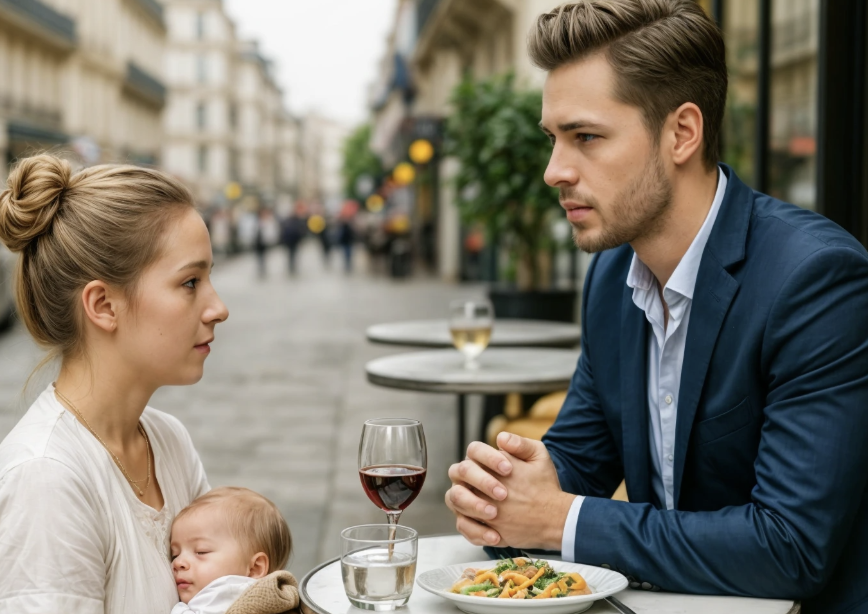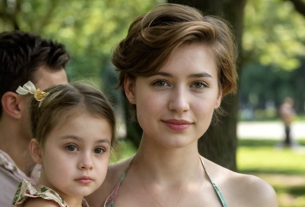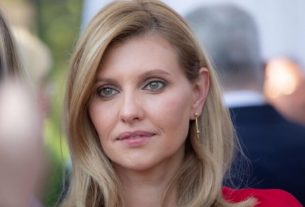She sank to her knees beside his sidewalk table, one arm cradling her infant tight. “Please,” she said, voice steady but small, “I’m not asking for money—just a minute of your time.” The man in the crisp suit glanced up from his glass of wine, not yet aware that a single request was about to loosen every certainty he’d been living inside.
Around them, the city throbbed—horns bleated, laughter rose from clustered patios, waiters threaded through chairs under a halo of string lights. But at Table 6, outside a fashionable French bistro, David Langston sat apart from the noise, absently circling his wine without drinking.
An untouched plate of lobster risotto cooled in front of him. Saffron and truffle drifted up, ignored. His head was somewhere else—lost in tickers and quarterly decks, in compliments that sounded expensive and meant nothing.
Then her voice broke through.
Soft. Fragile. Barely more than breath.
“Please, sir… I don’t want your money. Just a moment.”
He turned.
She was kneeling on the stone, knees pressed to the cold, a thin beige dress frayed at the hem and smeared with city grit. Her hair, hastily gathered, had come loose in wisps against her cheek. In her arms, swaddled in a worn brown blanket, slept a newborn.
David blinked once, twice.
She adjusted the bundle carefully and said, “You looked like someone who might actually listen.”
A waiter appeared at David’s shoulder. “Sir, would you like me to call security?”
“No,” David said, eyes on the woman. “Let her talk.”
The waiter paused, then retreated.
David tipped his chin toward the empty chair. “You can sit, if you’d like.”
She shook her head. “I don’t want to impose. I just… saw you alone. I’ve spent the whole day searching for a person who still has a heart.”
The words landed deeper than she could know.
“What do you need?” David asked, leaning closer.
She drew a breath. “My name is Claire. This is Lily—seven weeks. I lost my job when I couldn’t hide the pregnancy. Then the apartment. The shelters are full. I tried three churches today—every door was locked.”
She stared at the pavement. “I’m not asking for cash. I’ve had enough of cold looks and pretty promises.”
David studied her—not the dress or the posture, but the eyes. Tired, yes. And unafraid.
“Why stop at my table?” he asked.
Claire met his gaze. “Because you weren’t glued to your phone or laughing over dessert. You were quiet. Like someone who knows what it is to be lonely.”
He looked down at his plate. She wasn’t wrong.
Minutes later, Claire took the seat across from him. Lily slept on, warm against her. David asked for a fresh roll and another glass of water.
They shared a careful silence.
“Where’s Lily’s father?” David asked at last.
“He left when I told him,” she said simply.
“And your family?”
“My mom died five years ago. My dad and I haven’t spoken since I was fifteen.”
David nodded. “I know that kind of distance.”
Her eyebrows rose. “You do?”
“I grew up with more money than voices,” he said with a half-smile. “You figure out fast that it can’t buy warmth.”
She let that sit.
“Sometimes,” she murmured, “I feel like I’m fading. If it weren’t for Lily, I’d evaporate.”
David reached into his jacket for a card. “I run a foundation. On paper it’s for youth programs. Most years it’s mostly… accounting.”
He set the card between them. “Come in tomorrow. Tell them I sent you. We’ll get you a room, food, diapers. A counselor. Maybe even some work.”
Claire stared at the rectangle of cardstock as if it were a door.
“Why?” she whispered. “Why help me?”
His voice softened. “Because I’m tired of pretending I can’t see the people who still believe in kindness.”
Her eyes filled; she blinked the tears back. “Thank you. You have no idea.”
“I think I do,” he said.
Claire stood, thanked him again, and slipped into the evening, baby held close, shoulders a little less burdened.
David sat long after the plates were cleared.
For the first time in ages, the hollow space inside him didn’t echo.
He felt noticed.
And more than that, he realized he had noticed someone else.
Three months later, sunlight pooled across the floor of a small apartment where Claire stood brushing her hair, Lily perched on her hip. She looked different—rooted, alight, as if color had returned to her skin.
All because one man had said yes when the world offered no.
David Langston had kept his word.
The very next morning, Claire pushed open the foundation’s modest door, hands trembling, hope threadbare. But when she spoke David’s name, everything shifted.
They found her a small furnished room, stocked it with essentials, and introduced her to a counselor named Nadia, whose warmth felt like a porch light.
They also offered a part-time job at the outreach center.
Filing. Sorting. Helping. Belonging.
And nearly every week, David stopped by—not as the polished executive, but as David. The man who once couldn’t finish dinner now grinning as Lily gurgled on his lap during lunch breaks.
One evening he said, “Dinner. My treat. No babies crying—unless it’s me, struggling with the cork.”
Claire laughed. “Deal.”
Inside the bistro, candles burned low. Nadia babysat. Claire wore a pale blue thrifted dress she’d tailored by hand.
“You look… happy,” David said.
“I am,” she answered. “And a little scared. The good kind.”
“I know that one,” he said.
They let the quiet breathe—easy, unforced. Two people who had learned how to share space without filling it with noise.
“I owe you so much,” she said.
David shook his head. “You don’t owe me. You gave me something I didn’t realize I was missing.”
She tilted her head. “Which is?”
“A reason.”
Weeks drifted forward, and whatever was between them took root. No labels. No rush.
David started picking Lily up from daycare just to hear her squeal. He blocked off Fridays for “Claire and Lily time.” A small crib appeared in his spare room, though Claire never stayed the night.
His life, once muted, started to bloom.
He wore jeans to the office. Donated half his wine cellar. Smiled more than his staff had ever seen.
One rainy afternoon, Claire stood in the foundation’s rooftop garden, Lily tucked under her chin. David joined her.
“You okay?” he asked.
“I’ve been thinking…”
“Dangerous,” he teased.
She smiled. “I’m done only surviving. I want to live. I want to go back to school. Build something steady for Lily—and for me.”
His face softened. “What would you study?”
“Social work,” she said. “Someone saw me when everyone else looked away. I want to be that someone for the next person.”
He took her hand. “Whatever you need, I’ll—”
“No,” she said gently. “Walk with me, not for me. Side by side. Okay?”
He nodded. “More than okay.”
A year later, Claire stood on a modest stage, certificate in early childhood development in her hands—the first step on the way to social work.
David sat in the front row, Lily in his arms, clapping so hard her little palms turned pink.
Claire glanced down and saw them—the man and the child who had become her home—and her smile shone through fresh tears.
She hadn’t just been rescued.
She had risen.
And somehow, she had lifted the man who reached for her along the way.
That night, they returned to the same stretch of sidewalk, the same bistro, the same table where it began.
Only this time, Claire took a chair too.
Between them, Lily sat in a tiny high chair, demolishing breadsticks and squealing at passing headlights.
“Do you think that night was fate?” Claire asked, voice low.
David’s mouth tugged at one corner. “No.”
She blinked. “No?”
“I think it was choice,” he said. “You chose to ask. I chose to listen. And neither of us chose to leave.”
She reached across the table and laced her fingers through his. “Then let’s keep choosing—every day.”
Under the warm wash of café lights, folded into the city’s constant hum, they sat together—three hearts at one table.
Not broken.
Not a cautionary tale or a ledger line.
A family no one saw coming.



